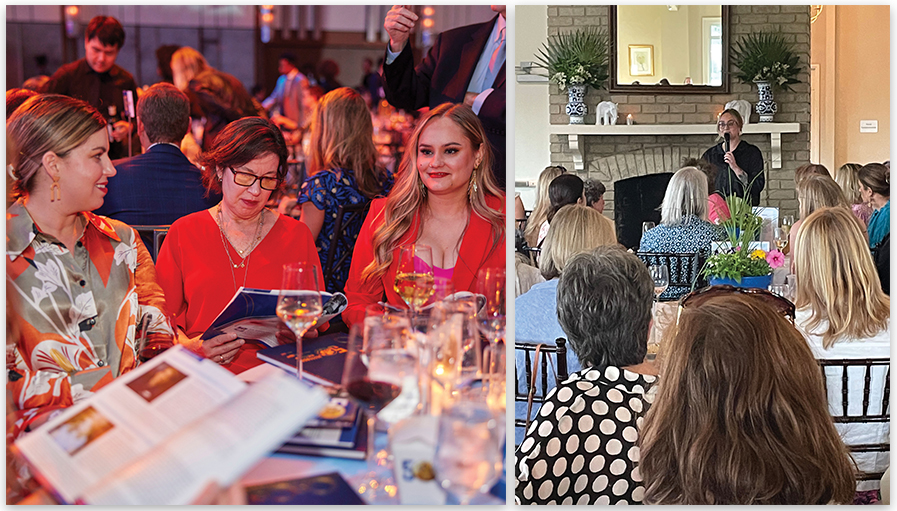Support the mission at this month’s Cocktails for a Cause fundraiser

Kat Wehunt founded The Formation Project after she escaped from a relative selling her for sex. She recently won a public service award from national nonprofit Multiplying Good.
Every Tuesday at The Formation Project’s North Charleston center, two dozen women gather around homemade dinners, talking affably about the week ahead. A handful play board games until the meal ends. From the outside, this could be any gathering of friends. But beneath the easy camaraderie, these women share a painful connection. Each has been a sex trafficking target. “We want everyone to have the option to not sell their body,” says executive director Kate Wehunt, who founded the organization to help women and men escape and rebuild their lives. As a tourist destination, Charleston is primed for such exploitation. “Sex trafficking is an under-identified crime, but it’s happening here at an alarming rate, whether you see it or not,” says Wehunt.
“The term ‘sex trafficking’ is misleading, because it implies movement,” she continues. “But kidnapping occurs in less than one percent of cases. I’ve seen mothers pimp daughters for rent and men convince teens to have sex with their [adult] friends, but these girls still attend school and go home every night.”
And 28-year-old Wehunt knows how deceiving appearances can be. The Florida native grew up in a seemingly stable home with a close family, but when she was 14, an older relative began selling her for sex at a nearby country club. She finally escaped at age 17, leaving home to study criminal justice and victimology at Florida International University.
As Wehunt’s career progressed in the movement against sexual servitude, which included securing a seat on the Survivor Advisory of the South Carolina Human Trafficking Task Force, the tenacious reformer felt something was missing. “People have good intentions to serve these survivors, but there’s a lack of survivor voice. I’m skeptical of any decision-making process that doesn’t include the stakeholders.”
Wehunt felt strongly that survivor input was an essential piece of the solution, and her proof came from a woman named Heaven. Their friendship began the day Wehunt, then a victim advocate, helped the “four-foot-10 spitfire” escape her pimp’s hotel room and took her to a women’s shelter. “For the next four years, I watched this brilliant, resourceful woman kick ass. She detoxed from heroin, got herself on food stamps, and mowed lawns for money. She was a success story.” Then Wehunt got the call—Heaven had overdosed and died. “It wrecked me. She felt like she didn’t have one person to turn to.”

(Left) Learn more about The Formation Project’s work and plans at the Cocktails for the Cause fundraiser on March 14 at the Harbour Club at WestEdge; (Right) Volunteers help with events and fundraising, as well as with the clothing closet, meals for support groups, transportation, and writing resumes.
With that, Wehunt knew that the standard approach to care needed to change. In 2019, Wehunt created The Formation Project, South Carolina’s only survivor-led nonprofit, to address those gaps in aid. “We can’t just say, ‘Check, check, check—you’re good, right?’” To leave an exploitative situation, sex trafficking survivors often leave behind everything and everyone they know. And while education, employment, and a residence may be needed, the most crucial support lies deeper than a tangible checklist. “Survivors are left with horrific trauma and vulnerability,” says Wehunt. “They’re resilient, but they need to learn to rely on others and build relationships.
“We want to see survivors living happy, healthy, thriving lives and taking a seat at the table of this movement, if they choose,” she adds. The Formation Project aims to see participants become substance- and alcohol-free, earn 250 percent more than the federal poverty level, gain reliable transportation, and engage in a support group. Since its creation, the nonprofit has assisted more than 100 survivors, though Wehunt measures success not by the number of participants, but by how well they are served. “On average, survivors see 28 different service providers in the first month.” The seven-member staff (half of whom are also survivors) and community volunteers walk alongside them as they navigate emergency shelters, legal systems, medical appointments, addiction counseling, trauma recovery, and more. A newly purchased house offers a transitional living space to up to seven participants for six to nine months.
And there are those Tuesday support meetings. “We talk about things like healthy relationships, going home for the holidays, and spirituality and help participants connect with other survivors,” explains Wehunt, who recently received the Jacqueline Kennedy Onassis Award for Outstanding Public Service Benefiting Local Communities from Multiplying Good. “In the end, I hope that’s our legacy: community.”
Mission Statement: Hear executive director Kat Wehunt share why she founded The Formation Project